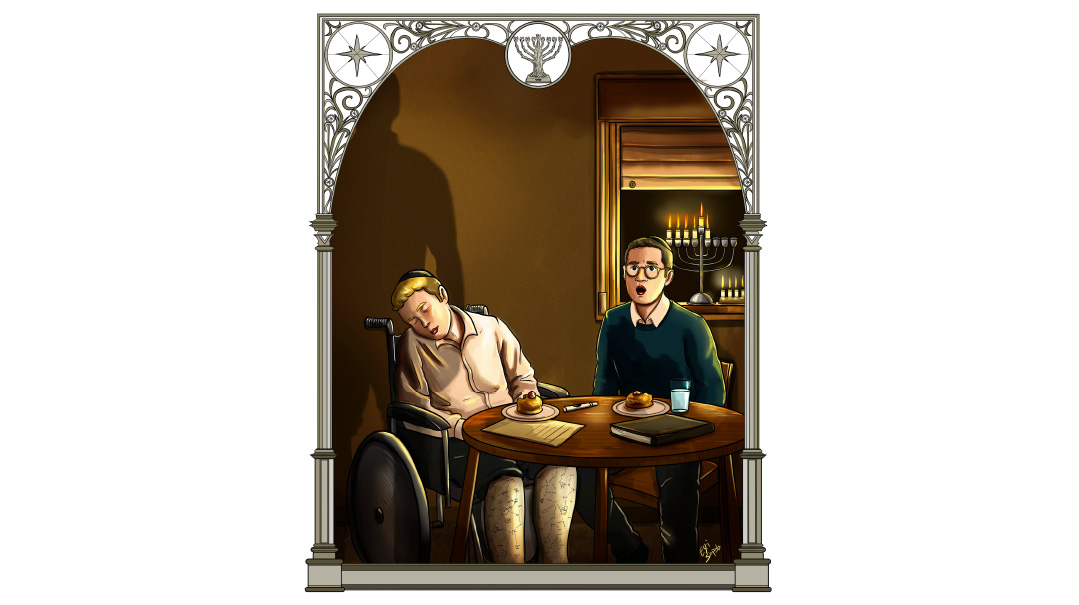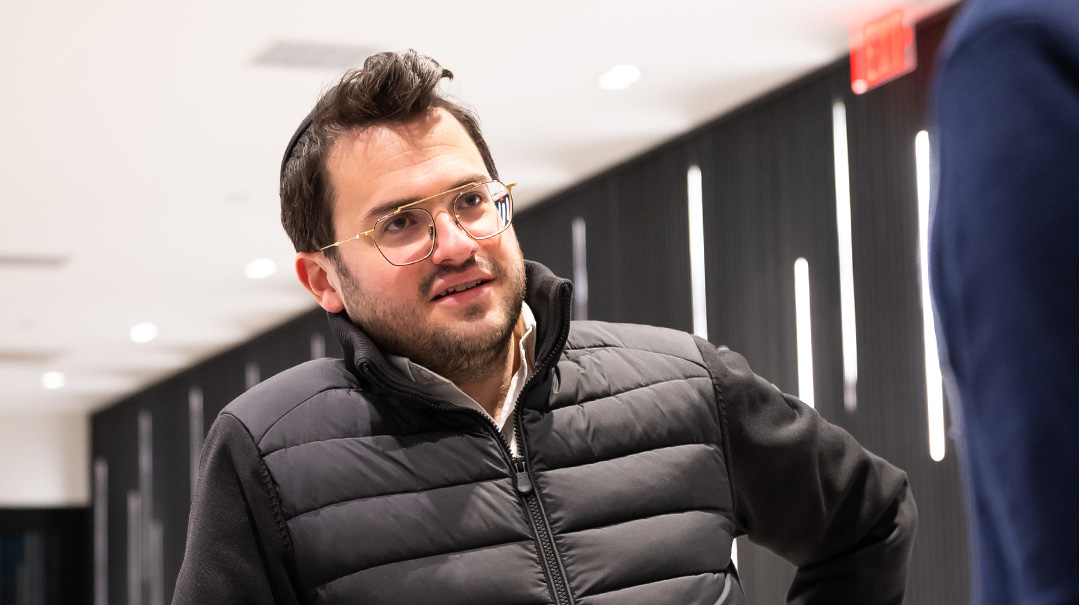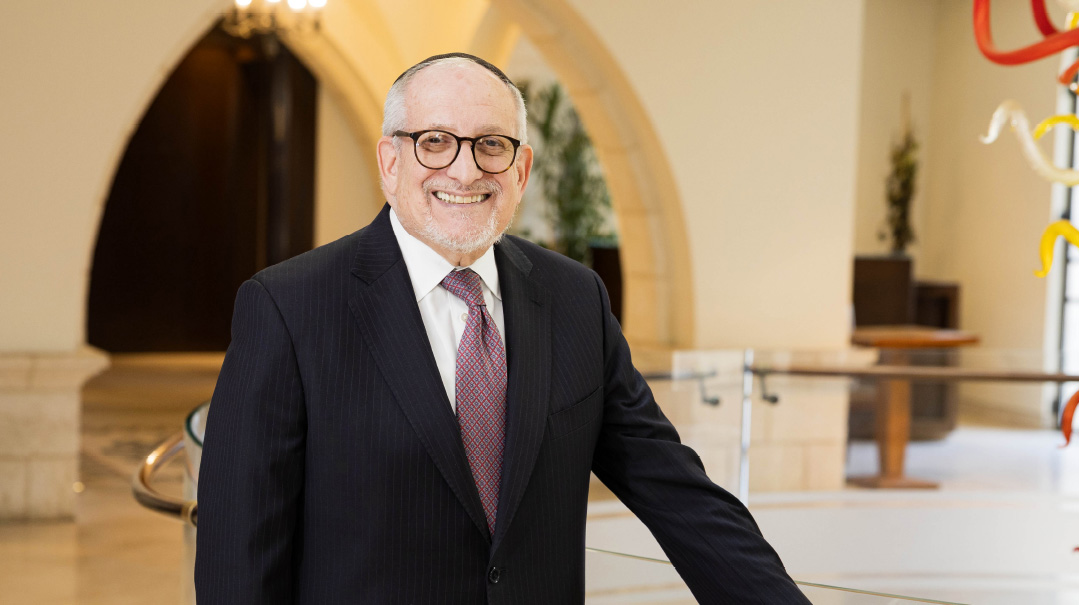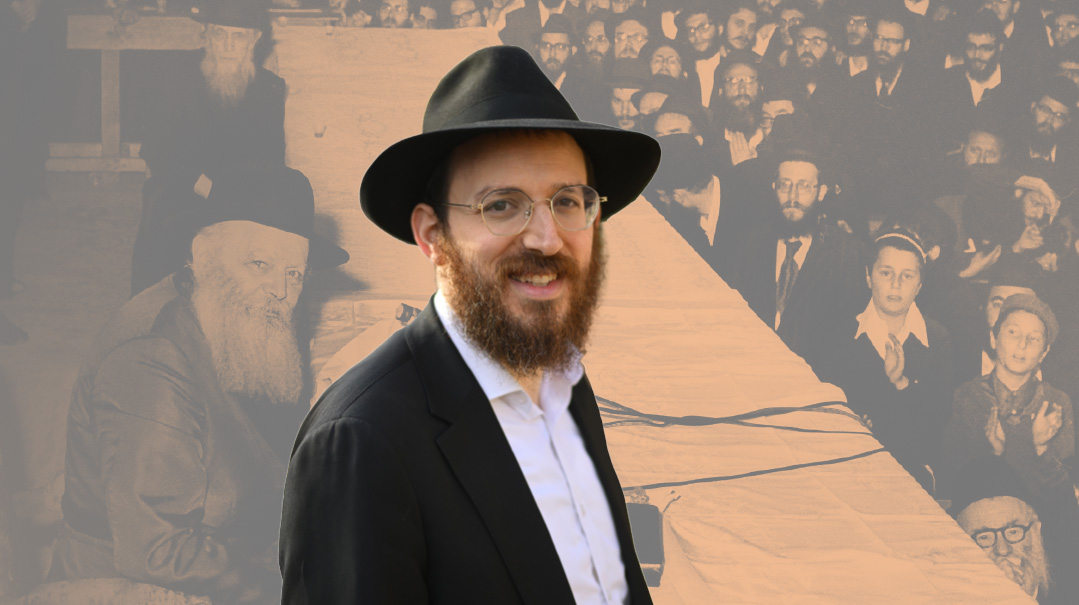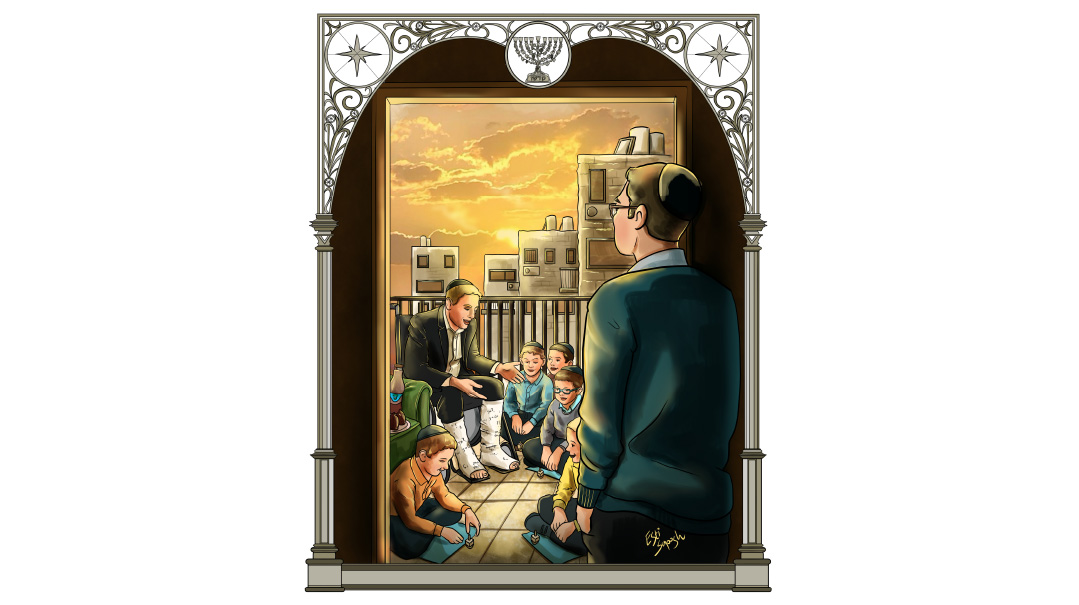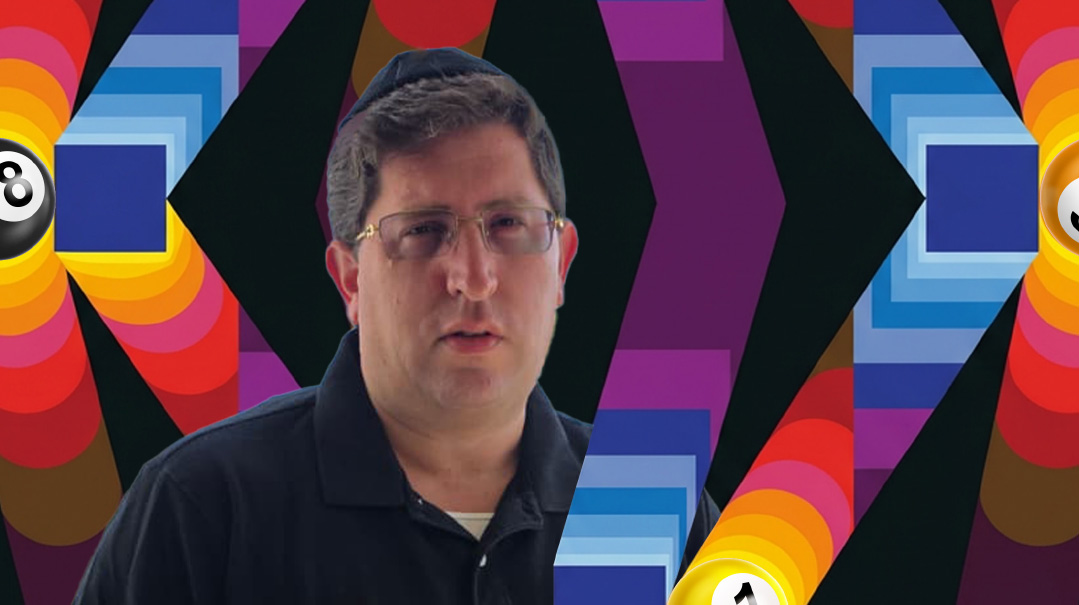Instant Motherhood
| November 30, 2016Many people thought that we had both lost our minds: how could I marry someone 16 years older than me with four kids?

As told to Riki Goldstein by Chana Rosenblatt
I suppose it all began with a plane ticket and a job my friend didn’t want.
I was an 18-year-old Bais Yaakov graduate living in Jerusalem with a wish to travel to the US to visit my extended family. But I couldn’t afford a ticket. So when a friend’s mother suggested I take up a job offer that my friend had rejected a six-month stint caring for four children in London whose mother was sick I agreed. As one of 12 I had a knack with little children and was adept at running a busy household. It would keep me busy I figured and pay for my ticket to America. I’m a person who throws myself into whatever I’m doing. As soon as I arrived at the Rosenblatts’ home I played with the kids laughed with them and loved them — we bonded right away and grew very close. Elana a”h and Shaul were a special couple with amazing children aged two four six and eight.
Unfortunately eight months after I arrived Elana passed away. I stayed for another four months to help the kids settle down then flew on to America for the long-awaited family visit.
Rocky Ride
A year after I left London behind the shidduch between Shaul Rosenblatt and myself was suggested. (It was actually my mother who suggested it first.) Soon we were engaged.
As I had lived with Shaul and his family for many months I knew exactly what I was getting myself in to. I had seen Shaul in action as a husband. And so I was a lot more confident going into the marriage than I might have otherwise been. He has lived up to and exceeded my expectations. I was just 20 years old; my husband was a 36-year-old rabbi who was running a successful organization — Aish UK — at the time. Many people thought that we had both lost our minds: how could I marry someone 16 years older than me with four kids? How could he marry someone so young and have her bring up his children?
During our engagement many people pressured us to break it off. Time baruch Hashem has proven them incorrect and we bear no ill will or judgment toward them. They did what they thought best. In such situations people struggle with issues of loyalty and have many conflicting thoughts and feelings. Still with so much pressure coming our way I didn’t know from one day to the next if the wedding was going to happen. At times I found that challenging but overall I saw the rocky ride as just part of the process we needed to go through…
Those who stood behind us made a huge difference. My family and my husband’s family were incredibly supportive all along. During the engagement and the first months of the marriage — and until today — there were a few people who were continuously kind and supportive. I found that kindness and support go a very long way: it gives you strength and holds you together in the face of insecurity or difficulties.
I was a little worried about “taking Elana’s place.” Rebbetzin Karlinsky a wonderful woman who lost her husband when she was young called me during my engagement and told me something that resonates with me to this day. She said that when someone leaves this world they go to a world of truth. In the world of truth people are not petty or angry or jealous they know what really matters. She explained that when a spouse passes away the soul is not completely at peace until his or her other half finds happiness. A man like my husband wants a wife and his children want a mother — and how could that bring anything other than complete peace and joy to his late wife? That comforted me and helped me get rid of a lot of my uncomfortable and guilty thoughts.
Carving Out Time
After sheva brachos we returned to London. We remained in the same house that my husband and his late wife had lived in. The kids were comfortable and settled there and we saw no need to uproot them. The household was busy but coming from a large family I was used to working hard. It helped that I happen to enjoy housework!
We had an active life and adapted to it quickly. There were no quiet evenings no quiet Shabbosim. I think we had two Friday night dinners on our own during the first ten years of our marriage! I found it hard to share my husband with everyone all of the time. My husband is a very devoted rabbi and works hard for the community. We didn’t share that development together — he was already in that position. After a long day with the kids and the house I’d wait for him to return home. And then all the kids would jump on him: “Abba Abba Abba.” My husband is a special man and our kids love him very deeply but I wanted more of him for myself. We did manage to go away alone for a week a few months after our marriage which was really nice. When I watch family and friends — and today my kids — during their shanah rishonah I smile but I would do it again 100 times over just the same! Very early on one of my mom’s friends told me to go out once a week with my husband to connect and spend some time together. We did that only a bit differently; we broke down the once a week into shorter times a few times a week. Several times a week we went for a walk together and every so often had lunch together. We still do that today.
A few years after our marriage a good friend of my mom came to stay for a few days. I think she found me overwhelmed and what she said was: at times we can get so busy taking care of everyone else that we forget that we matter just as much — look after yourself treat yourself every once in a while to something nice and give yourself what you feel you need. If you do that you’ll have more to give to everyone else... It was good advice.
The Kids’ Reactions
My oldest son who was nine when he lost his mother absolutely hated not having a mother; he was a sensitive boy and didn’t like the family being unsettled. During the year I was away his father had been through a broken engagement which was very hard for the kids.
I had built a very strong relationship with all of the kids during the time I spent with them and so our decision to get married filled the kids with relief. Akiva was nine when we got married and his kindness and welcome to me set the tone for the whole family. This immediate acceptance of me made it a lot easier with the other kids.
I never saw myself as a replacement for Shaul’s wife Elana in the same way that I never saw myself as a replacement for my kids’ mother. I knew Elana and loved and respected her. I was so much younger that to compare myself to her was never an option. In my mind she was always special wise good hearted and kind — an amazing mom. I don’t see us competing for the same spot but rather as different parts of the same unit.
It was important for me that my kids know where they come from and have a healthy relationship with that, so when I got married I put a picture of their mother up on the wall. Some people were surprised by that, but I didn’t believe that loving her and appreciating who she was and what she meant to them would take away from the love my kids have for me.
I tell my kids all the time that we have enough room in our hearts to deeply love many people. I don’t think feeling love for one needs to compromise feeling love for another. Being open and comfortable with Elana’s presence has always been helpful for our family.
Of course, as with all family dynamics, there were ups and downs and challenges. But I’m fully aware that we have the most incredible children; it always amazes me how much of Elana’s input is imbedded in her kids. So much of who they are is because of what she put in to them in their early years. Despite the short amount of time she had with them, and her being so unwell towards the end, the impact she had will last them for life.
Once, when my oldest son was eleven, I asked him to do something, and he refused.
“Listen to your mother,” I told him.
“You’re not my mother,” he said.
“I am very much your mother,” I responded.
I said that with no disrespect to his mother, Elana. It’s just that I have a different definition of mother. To me, a mother is not only the person who gave birth to you. A mother is the person who loves and cares for you. Elana was the mother who gave birth to them and cared for them through their early years. Sadly, she was not able to continue playing that role for them. I am here, now, to try to complement what Elana did, not to take away from it.
“Call me whatever name you like,” I told him, “but for me, the role I play as a mom is that commitment I made to open my heart to love you and care for you as a mother would. And I will continue to do that no matter what.”
One of the hardest moments for me was at a joyous time—when my son got engaged. I couldn’t get comfortable with the idea of walking him down the aisle. I felt I was standing in Elana’s place. After much thought, I went to my son and said “Maybe someone else should walk you down? Maybe your grandparents?”
He was as clear as a blue sky. “Absolutely not. If you don’t walk me down I won’t walk down. My whole life you tried to give me the feeling that I was just like everyone else, that I had a mother—and now on my wedding day you want to take that away from me?! That doesn’t make sense.”
I heard him and felt humbled. I realized that we human beings make up ideas that then get in our way – like the perception that only a birth mother should walk her son down the aisle. My firmly pre-conceived ideas were blocking me from doing what I had to do. That helped me get more comfortable with it and I was able to be there for him.
Over the years, I’ve had to learn to get more comfortable with being uncomfortable. Being uncomfortable isn’t truly a problem. It may not feel good, but it’s a human experience. The more I learn to understand that, the more comfortable I have become, despite discomfort.
A Growing Family
Less than ten months after we married, we were blessed with a baby girl. We called her Tzila Elana, after Shaul’s first wife. I always felt she brought the family the gift of knitting us all together; she still plays that special role. We had another thee boys after that.
Neither we, nor our kids, believe in “half” brothers and sisters. My husband reminds the family, every so often, that the shevatim, Yaakov Avinu’s sons, are never referred to as “half-brothers.” Our family is very close and united.
Shortly after having my baby girl, someone challenged me. “It must be impossible for you to love Elana’s kids the same way you love your baby,” she said. I realized that this person was stuck on her experience of love for her children being the ultimate experience of love. I told her that I love all of my kids, yet none of them the same. For each child I feel a deep sense of love and care which fills my heart with so much gratitude. That doesn’t mean to say I don’t get upset or annoyed or sometimes move away from the feeling of love. But I see the potential to love is there just the same, whether I gave birth to a child or not.
Seeing all of my children together, connected, loving, bonded and kind, is always very special for me. Little things— just chatting to my kids, connecting to them, spending time with all of them as a family or with any of them alone is such a treat for me. We feel very blessed.
My daughter’s teen years were challenging. My older daughter went through a stage of trying to work out her sense of loyalty; she gave me a rough time for a little while. People love to look at kids who lost a parent or went through challenge and say “It’s because of the hardship they went through that they’re struggling.” It was clear to me from the outset that that isn’t necessarily true. I come from a very loving and caring family and still went through my ups and downs as a teenager.
At one point I told a good family friend that I couldn’t deal with my daughter and I just don’t see how I will get through this. I remember him saying, “One day she’ll be your best friend and we’ll laugh about this.” I thought, Impossible. It could never happen! But it did. My daughter today is my very best friend; I love her more than I could even imagine. She is the most incredible human being, kind and good hearted just like her mother and my feeling of love and respect for her just keeps growing.
I’ve come to learn that feeling guilty or bad is not a good ingredient for making happy children; guilt took me down a very unhappy road for a little while. When I began to see that children, particularly teenagers, live in their own realities and have to figure things out for themselves and their angst is not always reflective of those around them, I found that I could be a lot more helpful and productive. I helped my kids more when I didn’t take things personally and let them go through whatever they had to go through while supporting them in any way I could.
I often tell my older kids that I do the best I can with the little understanding that I have. In the back of my mind, I tell myself that if Elana were ever to come back to collect her kids, I simply hope that she would be proud of them.
My four younger children were born by Caesarean. After my fourth, an ultrasound showed that I only have a half-developed womb, something that the doctor’s hadn’t pick up on until then. The obstetrician was astounded by this discovery. “By rights,” he told me, “you should not have been able to have children. I don’t know how you managed it four times. It’s something of a miracle!”
After this happened, my sister shared her perspective with me. Hashem gave you four miracle children – perhaps one gift for each of Elana’s children that you took into your heart. I smiled.
Yet I personally don’t see it that way, because my first four children were just as much a gift as my second four. I see every child as a “pikadon” –a G-dly deposit which Hashem gives us. We get the opportunity to love, care, give, and share His world with these beautiful people.
They were not a sacrifice for me—they were, and still are, simply a gift. All eight of my children are miracles for me and I thank Hashem every moment for the incredible kindness that He has blessed me with in my life. His love simply knows no bounds.
(Originally featured in Family First, Issue 519)
Oops! We could not locate your form.







